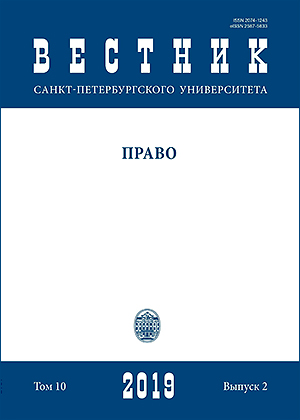International standards of the defendant’s legal status and the problem of legal terminology translation
DOI:
https://doi.org/10.21638/spbu14.2019.205Abstract
A comparative analysis of the European Convention English and its official Russian variants, as well as the text of the Russian criminal procedure law and the accepted theoretical understanding of European Convention notions and terms, allows us to reveal extra possibilities for comprehending the systemic sense of the international standards of human rights and justice. The European Convention describes a prosecuted person as someone charged and who has a minimum set of rights. The official Russian translation uses the term обвиняемый, although the minimum of rights stretches to cover not only the Russian обвиняемый/a accused person (article 47 of the Russian Federation Criminal Procedure Code), but also the suspect as well (article 46 of the Russian Federation Criminal Procedure Code). In this case, the Russian translation offers a narrower meaning to the term used in the Convention. Nonetheless, the systemic sense requires a broader interpretation of the term and of the array of rights of the Russian suspect and corresponding duties of law enforcement bodies. In other cases, the Russian translation employs terms with a broader meaning compared to the analogous English terms; for example, the Russian word combination через посредство защитника possesses a broader meaning than the English through legal assistance. The analysis of the literal translation of the text of the European Convention may be useful not only for the correct interpretation of its provisions, but also for the practice of protection in criminal cases in the context of modern Russian legal reality.
Keywords:
defendant, charged, suspect, defender, defence, charge, suspicion, qualified legal assistance
Downloads
References
Downloads
Published
How to Cite
Issue
Section
License
Articles of "Vestnik of Saint Petersburg University. Law" are open access distributed under the terms of the License Agreement with Saint Petersburg State University, which permits to the authors unrestricted distribution and self-archiving free of charge.






